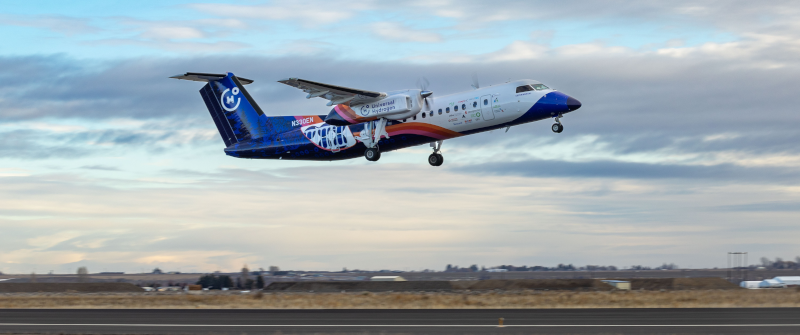
Universal Hydrogen completes first flight of hydrogen regional airliner
By DE Staff
General AerospaceCompany says its modified Dash-8 is the largest airplane to cruise principally on hydrogen.

Universal Hydrogen’s modified Dash-8, nicknamed “Speedy McClean,” successfully completes first flight of hydrogen regional airliner.
(Photo credit: Business Wire)
Universal Hydrogen Co. announced it has successfully completed a test flight of its modified 40-passenger Dash-8 regional airliner using hydrogen fuel cell propulsion. Nicknamed Lightning McClean, the airplane flew for 15 minutes, reaching an altitude of 3,500 MSL. The flight, conducted under an FAA Special Airworthiness Certificate, was the first in a two-year flight test campaign, with passenger service expected to begin in 2025.
For its first test flight, the airplane employed a conventional turbine engine for safety while the other was replaced by the company’s fuel cell-electric, megawatt-class powertrain, built around Plug Power’s ProGen family of fuel cells modified for aviation use. The powertrain’s design is unique in that it doesn’t use a battery; instead, the fuel cells drive the electric motor directly. The motor is a modified magni650 electric propulsion unit and power electronics were supplied by Everett-based magniX.
“During the second circuit over the airport, we were comfortable with the performance of the hydrogen powertrain, so we were able to throttle back the fossil fuel turbine engine to demonstrate cruise principally on hydrogen power,” said the company’s test pilot, Alex Kroll. “The airplane handled beautifully, and the noise and vibrations from the fuel cell powertrain are significantly lower than from the conventional turbine engine.”
The company is backed by GE Aviation, Airbus Ventures, Toyota Ventures, JetBlue Ventures and American Airlines, as well as several hydrogen producers and financial investors, the company says. From regional airplanes, the company says it plans to progress to larger ones and to hydrogen fuel deliveries for other mobility applications using its modular logistics network.
“More than half of aviation CO2 emissions today come from the A320 and 737 family of aircraft,” said Universal Hydrogen co-founder and CEO, Paul Eremenko. “Both Airbus and Boeing will need to replace these venerable airplanes with a new design starting development in the late-2020s and entering passenger service in the mid-2030s. Making their successors hydrogen airplanes is a golden opportunity—perhaps the only opportunity—for aviation to get anywhere near meeting Paris Agreement emissions targets without having to curb aviation traffic volumes.”
https://hydrogen.aero
